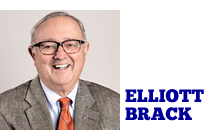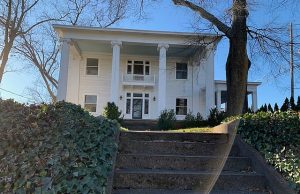NEW YORK CITY has its High Line Trail. Here in Gwinnett County, Peachtree Corners has under construction the beginning of an eventual 11.5 mile trail through the city, one of which will be elevated for a part of way, as seen under construction near 45 Technology Parkway South. Call it Peachtree Corners own High Line.
 TODAY’S FOCUS: Eliza Pinckney Famous in Her Own Right in South Carolina
TODAY’S FOCUS: Eliza Pinckney Famous in Her Own Right in South Carolina
EEB PERSPECTIVE: Impeachment Trial May Be Democrats’ Last Hope To Oust Trump
ANOTHER VIEW: Appears the Economy Is Chugging Along; Enjoy It Now
SPOTLIGHT: Precision Planning, Inc.
FEEDBACK: Here Are a Few Solutions To Inform The Fearful Electorate
UPCOMING: New Community Foundation Non-Profit Academy Begins Soon
RECOMMENDED: In Search of Mary Shelley, the Girl Who Wrote Frankenstein by Fiona Sampson
GEORGIA TIDBIT: Plant Life Abounds on Many of Georgia’s Granite Outcrops
MYSTERY PHOTO: Aerial Photo of Countryside Is Today’s Mystery Picture
CALENDAR: Elections Board Building To Be Named for Beauty Baldwin
Eliza Pinckney famous in her own right in S.C.
(Editor’s note: After learned of two key Revolutionary War figures named Pinckney of South Carolina, and one of them who invested speculatively on frontier Georgia, for which Gwinnett’s area was named “Pinckneyville,” today our contributor tells of another Pinckney, a woman, who is famous in her own right. Thanks to John Titus for this research.—eeb)
By John Titus
PEACHTREE CORNERS, Ga. | Eliza Lucas was born December 28, 1722 on the Caribbean island of Antigua, the eldest child of Lt. Col. George Lucas, a British Army officer and his wife Ann. She had two brothers, Thomas and George, and a younger sister Polly. The three oldest were sent to London for schooling where Eliza’s ability was recognized. She declared her favorite subject was botany.
In the 1730s Colonel Lucas moved his family to South Carolina because of the increasing tensions between England and Spain. His father, John Lucas, owned three plantations there and they chose to reside at the one closest to Charleston. In 1738 Colonel Lucas returned to Antigua to deal with the political conflict with Spain. He left 16 year-old Eliza in charge of the plantations, her ailing mother and a toddler sister. Her mother died shortly thereafter. The two sons were still in school in London.
From Antigua, Colonel Lucas sent Eliza various types of seeds for trial on the plantations seeking crops to supplement the cultivation of rice. She experimented with several, and finally planted indigo. In doing so she made use of the knowledge and skill of enslaved Africans who had grown indigo in West Africa and the West Indies. Eliza persisted for three years and then used her 1744 crop to make seed and shared it with other planters, leading to an enormous expansion of indigo production. (It is what she is best known for.) The volume of indigo dye exported increased from 5,000 pounds in 1745-1746 to 130,000 pounds in 1748. Indigo became South Carolina’s second leading cash crop. Indigofera tinctoria, also called true indigo, is a species of plant from the bean family that was one of the original sources of indigo dye.
 Eliza participated in Charleston society. Her friend, Mary Bartlett, was the niece of a prominent lawyer, Charles Pinckney. He and his wife often entertained Eliza at their plantation. In 1744 Mrs. Pinckney died and shortly thereafter Charles proposed to Eliza. George Lucas had no dowry to offer except his daughter’s indigo crop. Charles accepted the indigo project along with his young bride. He was 45 and she was 22. Over the next six years Charles Cotesworth, George Lucas, Harriott, and Thomas were born.
Eliza participated in Charleston society. Her friend, Mary Bartlett, was the niece of a prominent lawyer, Charles Pinckney. He and his wife often entertained Eliza at their plantation. In 1744 Mrs. Pinckney died and shortly thereafter Charles proposed to Eliza. George Lucas had no dowry to offer except his daughter’s indigo crop. Charles accepted the indigo project along with his young bride. He was 45 and she was 22. Over the next six years Charles Cotesworth, George Lucas, Harriott, and Thomas were born.
In 1753 Charles Pinckney became South Carolina’s agent in London and moved the family there, planning to stay until the children completed their education. When the French and Indian War broke out and their properties were in danger, the Pinckneys decided to return to South Carolina. Leaving the boys, they returned in 1758 where Charles quickly contracted malaria and died. At age 36 Eliza was a widow and would not see her sons again until they were men.
After the war ended in 1763 South Carolina again prospered with steady commerce between the colony and England. However, English colonial policies ultimately led to the colonies declaring independence. Charles Cotesworth and Thomas returned as dedicated patriots and both served in the Colonial Army. During the war, Eliza stayed with Harriott at her plantation. Her own homes were destroyed.
The Revolutionary War left South Carolina destitute and both Charles and Thomas were involved in restoring it. Eliza continued to stay with Harriott helping to care for grandchildren as both sons held political offices and were often away.
In 1793 Eliza Pinckney, seeking treatment for breast cancer, traveled to Philadelphia. Shortly after her arrival on April 20, she was visited by several doctors, and many prominent persons, including President George Washington. Unfortunately, she died a few weeks later and was buried May 27, 1793, in Philadelphia, far from the Low Country she had cultivated and cherished. At his request, George Washington was a pallbearer.
In 1989 Eliza Pinckney was the first woman to be inducted into the South Carolina Business Hall of Fame for her contributions to South Carolina’s agriculture.
- Have a comment? Send to: elliott@brack.net
Impeachment trial may be Democrats’ last hope to oust Trump
By Elliott Brack
Editor and Publisher, GwinnettForum
JAN. 21, 2020 | If the Democrats do not want to have to go up against President Trump in the 2020 elections, their best hope is to get the Senate to convict him of wrongdoing in the impeachment trial. Right now, that does not seem likely, as Republican senators appear to have their ears and minds closed and may vote as a bloc to allow him to remain in office. Thank you, Mitch McConnell.
 It appears that no matter which Democrat might run against the president in the fall, it appears that President Trump some how, some way, will win the fall election, at least in the Electoral College. Even though the president did not win the majority of the vote in 2016, he has a certain magic with staunch conservatives and many ordinary people. So he can count on their support, come what may. Their minds are closed. He will probably get the big industrial Midwest, garnering their key big electoral votes, and go back into office.
It appears that no matter which Democrat might run against the president in the fall, it appears that President Trump some how, some way, will win the fall election, at least in the Electoral College. Even though the president did not win the majority of the vote in 2016, he has a certain magic with staunch conservatives and many ordinary people. So he can count on their support, come what may. Their minds are closed. He will probably get the big industrial Midwest, garnering their key big electoral votes, and go back into office.
Modern technology may be the culprit. Perhaps if instant communications through the Internet, Tweets, Instagram, television, etc. were not present, maybe the president would not win re-election. But he has mastered this direct way to communicate. It is far-reaching and ever-encompassing. The President’s support may be a thin one, but again, just enough to put him on top another four years. He will probably lose the popular vote again.
We say this hoping he doesn’t win re-election.
After all, Donald Trump has sullied the office of the president, to the point that mothers today may no longer suggest that their children to grow to be president. We feel he has soiled the office with his bullying, his misinformation, his inability to accept guidance, his quick-handed reaction to frustrations, his efforts to ignore Congress, and his overall demeanor touching on ignorance.
Oh! What we would have given, had we known, to have his parents, at least a few times, to say “NO!” to him. He has never had that discipline, as a child or adult, and seems intent to never have it.
Simply, he has not been a president that a majority to look up to. Some people cringe just to see his image, knowing what he is.
Now the United States, under Trump, is an embarrassment to much of the world. Many no longer see us as an example of the civilized and restrained world as we should be.
Yet you would think that President Trump, running again, would have enraged some of his previous supporters. You would think that there are enough previous supporters who recognize the error of their ways when they voted for him, and would turn against him.
However, we suspect that the president will have attracted enough new voters to replace his departed previous supporters. Who that might be is beyond us.
The impeachment trial this week is the Democrats’ one best hope that a few Republican senators are going to see and understand what President Trump is doing to our nation. Though it appears unlikely, perhaps that trial will work on the Senators’ conscience so that in the long run they will say, “What the heck. I’m sick and tired of what he has put us through. No matter what it costs me, I’m going to do the right thing!”
Pie-in-the-sky? Maybe. That’s about our one last hope for the present. It may not be our Georgia senators way to go, but we can hope others see more clearly what needs to be done, and will vote accordingly.
- Have a comment? Send to: elliott@brack.net
Appears the economy is chugging along; Enjoy it now
By Debra Houston, contributing columnist
LILBURN, Ga. | According to right-leaning Fox Business News, our economy is making vibrant gains. The credit, they say, goes to President Trump. Skip over to left-leaning CNBC’s “Squawk on the Street,” and you’ll find a more pessimistic view in which they blame the president. I wonder if CNBC hopes the bottom drops out of the stock market to further damage our impeached president. So goes hatred in the 21st Century.
![]() Recently Chief Squawker Jim Cramer (CNBC) said President Trump would “crow” about the Dow Jones Industrial Average reaching a record peak of 29,000, “even though the index is outdated.” Then why track it, Jim? Wow, he’s unwilling to give the president so much as a crumb.
Recently Chief Squawker Jim Cramer (CNBC) said President Trump would “crow” about the Dow Jones Industrial Average reaching a record peak of 29,000, “even though the index is outdated.” Then why track it, Jim? Wow, he’s unwilling to give the president so much as a crumb.
At least the cable shows buzz with excitement compared to the nightly news programs. The three networks occasionally report good economic news but often try to confuse the issue. For example, an anchor might say, “Unemployment is at a record low, but that doesn’t mean everyone has a job.” That’s true, but it’s because companies can’t find workers trained in specialized trades, such as high-tech. Often anchors don’t tell you what you need to know.
Current indicators confirm a flourishing economy — unemployment at 3.5 percent, wages continuing to rise, low inflation on most goods, and the S&P and Dow breaking stock market records — but we’ll hear nothing but bad news in 2020 because it’s an election year. Be assured, a misstep from any sector of the economy will cause The New York Times to splatter the bad news all over its front page.
As far as stocks are concerned, I’m not naive. I learned the hard way that markets are subject to gravity. (What goes up does come down.) Back in the ’90s, Lucent Technology was the hot stock of the decade as well as my husband’s entire 401K plan. From a variety of options offered, we put everything into Lucent. When it plummeted, we had nothing in the 401K to fall back on. Instead of diversifying, we put “all our eggs into one basket.”
The Lucent loss didn’t scare us away from stocks: We’re wiser now. Yes, there’s risk in the stock market, but I encourage all wage-earners to invest. Do your homework first. If you’re nervous, by all means, start slow, and never invest in anything you don’t understand. Too, don’t forget that even a slow-growth stock sometimes offers generous dividends.
The economy is doing well. Enjoy it.
- Have a comment? Send to: elliott@brack.net
Precision Planning, Inc.
 Today’s underwriter is Precision Planning, Inc., a multi-disciplined design firm based in Lawrenceville, Georgia with a 37-year history of successful projects. In-house capabilities include Architecture; LEED® Project Management; Civil, Transportation and Structural Engineering; Water Resources Engineering; Landscape Architecture; Interior Design; Land and City Planning; Land Surveying; and Grant Administration. PPI has worked diligently to improve the quality of life for Georgia communities through creative, innovative planned developments, through the design of essential infrastructure and public buildings, and through promoting good planning and development principles. Employees and principals are involved in numerous civic, charitable and community based efforts in and around Gwinnett County. For more details, visit https://www.ppi.us
Today’s underwriter is Precision Planning, Inc., a multi-disciplined design firm based in Lawrenceville, Georgia with a 37-year history of successful projects. In-house capabilities include Architecture; LEED® Project Management; Civil, Transportation and Structural Engineering; Water Resources Engineering; Landscape Architecture; Interior Design; Land and City Planning; Land Surveying; and Grant Administration. PPI has worked diligently to improve the quality of life for Georgia communities through creative, innovative planned developments, through the design of essential infrastructure and public buildings, and through promoting good planning and development principles. Employees and principals are involved in numerous civic, charitable and community based efforts in and around Gwinnett County. For more details, visit https://www.ppi.us
- For a list of other sponsors of this forum, click here.
Here are a few solutions to inform the fearful electorate
Editor, the Forum:
![]() In a previous letter to the editor, I expressed concerns about our electorate being fearful and ill-informed. I now want to express some of my solutions.
In a previous letter to the editor, I expressed concerns about our electorate being fearful and ill-informed. I now want to express some of my solutions.
I believe that every child in the United States needs to understand our constitutional democracy. As Justice Sandra Day O’Connor has stated, we need for every student to be required to pass a civics class in high school. (Georgia does not.) In addition, like Arizona and North Dakota, I would require students to pass the same citizenship test required to become a naturalized citizen.
Legally, politicians are not required to tell the truth. I would change the rule that protects political speech. Political dialogue would become trustworthy if the voters had protections against the outright lies politicians offer.
I do not believe churches should engage in political action. Right now many religious organizations encourage their parishioners to vote one way or the other. This is against the IRS rules since the Johnson Amendment that allows churches to be tax exempt only if they avoid political action. This law is not being enforced. As a result, many voters believe it’s their spiritual responsibility to vote for the candidate sponsored by their church.
I remember when the Federal Communication Commission required broadcasters to present honest, equitable, balanced, and equal time for political speech. By returning to this standard I believe our electorate would have greater respect for our elections. In keeping with this standard I would also require social media organizations to meet the same standards as a news organization.
Common Core is a suggested curriculum offered to improve the quality of American education. Part of the standards of this curriculum is the teaching of critical thinking skills. In order for voters to appropriately analyze the myriad to facts that is required be a thoughtful voter it is essential that they are able to critically analyze the information that is available.
I do not think that corporations should have the same rights for political contributions as do individual voters. Citizens United, I believe, has enabled monied interests to have an unreasonable influence on voters. We are confronted with so much political advertising that electoral confusion is pervasive.
Some in our society are susceptible to appeals to our underlying fears. This brings unjustified anger and poor electoral decisions. In order to overcome these fears we need to have a concerted effort in our churches, our media, our families to encourage an honest evaluation of our societal strengths and dangers.
In closing I quote Plato. “If you do not take an interest in the affairs of your government then you are doomed to live under the rule of fools.”
— Al Schneiberg, Sugar Hill
Dear Al: Sounds good, but getting politicians not to extend the truth? Tough sledding. –eeb
Keep savvy, say “no!” to phishermen, unfamiliar phone calls
Editor, the Forum:
Good article by Marty Hester on phishing, plenty of information. However, there’s really only one step to keep yourself from being phished or hacked: don’t open anything that’s unfamiliar.
If you do, stop! when they ask for the first piece of personal information (or, if it’s a call, hang up).
Then call the customer fraud department of whatever business or service they are promoting and give them their address or telephone number! These phishermen are pretty savvy, sound completely believable, and, unfortunately, can catch almost anyone. Be aware, be wary, never say “yes,” (they take that yes out of context and use it as they will)…just say no! and mean it.
— Keni Woodruff, Lithonia
Now finds she is related to Charles Cotesworth Pinckney
Editor, the Forum:
The snow we had last week has finally melted, just in time for a day in the 60s! We will drop again after this storm front passes through, and February looms with predicted below average temps and above average precipitation.
I had to smile when I saw your article on Charles Cotesworth Pinkney — he was my fifth great-grandfather, via Sarah Middleton. I only found this through DNA testing and links to other matches, but the genealogy adds up. How I wish I had known that when I was actively painting for my Charleston patrons!!
Researching my family through the many ways we have available now has been fascinating. I’m planning a trip to Scotland this year to visit Crathes Castle, the ancestral home of the Burnett family, where my research has led me! Looking forward to seeing the Horn of Leys, given to my ancestor Alexander Burnett, the royal forester of Drum, when he supported Robert the Bruce and was granted his land near Aberdeen. Everyone has a story, they say.
— Karen Burnette Garner, Robesonia, Penn.
Send us your thoughts: We encourage you to send us your letters and thoughts on issues raised in GwinnettForum. Please limit comments to 300 words. We reserve the right to edit for clarity and length. Send feedback and letters to: elliott@brack.net
New Community Foundation Nonprofit Academy to begin
The Community Foundation for Northeast Georgia has announced that they have rebranded their education events and created the Nonprofit Academy, to launch January 30, 2020. The Nonprofit Academy will kick off the Community Foundation’s 2020 education events on January 30 with Starting Point, an intensive, half-day of learning and networking for nonprofits.
It will be held from 7:30 a.m. to 1:30 p.m. at Sonesta Gwinnett Place. The event features speakers from Facebook Atlanta, Columns Fundraising and Excelsior Insights. Cost is only $75 for the entire event. The keynote lunch speaker is Milton Little, president and CEO of United Way of Greater Atlanta.
Participants can choose to attend five tracks with three classes within each track for a total of 15 classes to choose from. The five tracks are Fundraising, Leadership development, Storytelling, Business operations and Relationship development. Session topics include:
- How to ask for asset wealth vs. income wealth;
- Leading change and culture to sustain success;
- The insider’s scoop from Facebook;
- Why risk management matters for non-profits; and
- The secret to high-performing boards (it might not be what you think).
Randy Redner, CEO and president of the Community Foundation, says: “Our goal in creating our Non-profit Academy and launching the year with Starting Point was to help our non-profit partners get off to a great start in 2020.”
Little is the first African-American president of United Way of Greater Atlanta, the second-largest in the national system, in July 2007. Altogether, Little has helped raise more than a billion dollars for local community needs and priorities. Before joining United Way, he served as chief operating officer and interim president and CEO of the National Urban League. He graduated magna cum laude from Morehouse College with a B.A. in sociology and earned an M.A. in urban sociology and social policy from Columbia University.
- For a full list of speakers and topics and to register, visit www.cfneg.org/nonprofitacademy
In Search of Mary Shelley, the Girl Who Wrote Frankenstein,
by Fiona Sampson
![]() From Susan McBrayer, Sugar Hill: If you’re looking for minute details about the life and times of Mary Godwin Shelley, this may be your book. It is particularly strong on the history, the social norms, the new science discoveries, the great minds and the rebellions during the times she lived (late 1700s and early 1800s). But if you’re looking for the story about how Shelley wrote and developed Frankenstein, it’s surprisingly lacking. It barely mentions it. The book focuses on the big-picture setting in which Mary Shelley was born, on her famous and controversial parents, and on the hardships of a frequently pregnant woman married to a philandering and mostly absent husband, Percy Shelley. I recommend this book with hesitation because it includes the author’s too numerous opinions and speculations. And, while I really loved the history bits, I really wanted to hear more about Frankenstein.
From Susan McBrayer, Sugar Hill: If you’re looking for minute details about the life and times of Mary Godwin Shelley, this may be your book. It is particularly strong on the history, the social norms, the new science discoveries, the great minds and the rebellions during the times she lived (late 1700s and early 1800s). But if you’re looking for the story about how Shelley wrote and developed Frankenstein, it’s surprisingly lacking. It barely mentions it. The book focuses on the big-picture setting in which Mary Shelley was born, on her famous and controversial parents, and on the hardships of a frequently pregnant woman married to a philandering and mostly absent husband, Percy Shelley. I recommend this book with hesitation because it includes the author’s too numerous opinions and speculations. And, while I really loved the history bits, I really wanted to hear more about Frankenstein.
- An invitation: what books, restaurants, movies or web sites have you enjoyed recently? Send us your recent selection, along with a short paragraph (100 words) as to why you liked this, plus what you plan to visit or read next. Send to: elliott@brack.net
Plant life abounds on many of Georgia’s granite outcrops
Granite outcrops stand in stark contrast to the surrounding matrix of old-field areas and oak-hickory-pine forest. They are populated by a unique, highly specialized group of plant species that differ strikingly in aspect from adjacent areas that support zonal vegetation. Perhaps the most obvious differences are seen in the terrestrial plants that occur in areas associated with the bare granite.
One immediate difference that strikes an observer is the scarcity of woody plants. Whereas oaks, hickories, and pines dominate most of the Piedmont region, annual and perennial herbs with adaptations to avoid or resist drought reigns supreme on granite outcrops. Among the few characteristic trees found on outcrops is Georgia oak (Quercus georgiana). Pines often grow on outcrops, too, with either loblolly pine (Pinus taeda) or shortleaf pine (P. echinata) eventually invading the deepest accumulations of soil over the rock. Another local name for granitic flatrocks is cedar rocks, reflecting the common occurrence of red cedar (Juniperus virginiana).
A few shrubs and woody vines, though by no means limited to granite outcrops, may grow especially well in the thin woods at the margins of outcrops. Fringe tree (Chionanthus virginicus), for example, seems to flower much more prolifically in such settings than in the dense shade of forests, as do wafer ash (Ptelea trifoliata), painted buckeye (Aesculus sylvatica), and serviceberry (Amelanchier arborea).Among the woody vines are such spectacular plants as yellow jessamine (Gelsemium sempervirens), crossvine (Bignonia capreolata), and greenbrier (Smilax smallii).
It is the herbaceous plants, however, that give the granite outcrops their distinctive character. These plants are often classified into four categories, based on the maximum depth of soil over rock. The “diamorpha community,” existing in soil depths of one to three inches, consists of a single vascular plant, Diamorpha smallii. This diminutive winter annual is able to invade and dominate because of its ability to tolerate low moisture levels in the soil and because it is free from competition in this stressful microenvironment. Occasionally a few cryptogams (plants that reproduce through spores rather than seeds or flowers), including lichens and mosses, occur with D. smallii.
(To be continued)
- To view the Georgia Encyclopedia article online, go to http://georgiaencyclopedia.org
Aerial photo of countryside is today’s Mystery
Ah, what a beautiful scene from the air….but which scenery is this? Identify if you can where this photograph, today’s Mystery Photo, was made. Send your answer to elliott@brack.net, and be sure to include your home address.
 The always unflappable George Graf of Palmyra, Va. wrote of the last edition’s Mystery Photo: “You were correct, this was a difficult one to find.” However, he sent in an answer in the first hour of publication! He also gave some background on the photo. “It is the Clarence R. Ware House, 293 North Perry Street, Lawrenceville. This house was built by Mr. Ware in 1910, and is historically significant in the areas of architecture and local history.
The always unflappable George Graf of Palmyra, Va. wrote of the last edition’s Mystery Photo: “You were correct, this was a difficult one to find.” However, he sent in an answer in the first hour of publication! He also gave some background on the photo. “It is the Clarence R. Ware House, 293 North Perry Street, Lawrenceville. This house was built by Mr. Ware in 1910, and is historically significant in the areas of architecture and local history.
“Architecturally, it is one of only two Neo-Classical style residences remaining in Lawrenceville, a town which has lost much of its historic architecture. It is a good example of a small town interpretation of the Neo-Classical style. In terms of local history, the house is significant as the home of Clarence R. Ware. For much of his working career he was president of the First National Bank of Lawrenceville.
“Ware (1872-1955) was a leading citizen of Lawrenceville who made valuable contributions to the educational, commercial and religious life of the community. He moved to Lawrenceville in 1900 to become superintendent of the local schools, taught for two years previously in neighboring Barrow County. From 1907 until 1920 he served as Gwinnett County School Superintendent, during a period when Gwinnett County, and many other Georgia counties, were struggling to improve their public school systems. In his 1908 annual report, Ware lamented that ‘the people of this county are, as a whole, very indifferent towards educational matters, and that there is a crying need for compulsory educational legislation.’ Attempts were made by Ware and the school board to improve the quality of Gwinnett County teachers’ credentials and to enact a compulsory attendance law, but in 1920 the county’s public education system lagged behind many in Georgia. Ware also helped organize the First National Bank of Lawrenceville and was elected its first president and director. He was active in the Kiwanis Club and served as Director of the Methodist Church Sunday School. In 1929, he moved his family to Atlanta, but he commuted to the bank in Lawrenceville for many years.”
The photo came from Gloria James of Lawrenceville. She tells us that the house is now owned by Grady Gower of Atlanta.
Others recognizing the photo include Hoyt Tuggle, Lawrenceville; Lou Camiero, Lilburn; and Sara Rawlins of Lawrenceville, who added: “That is the house on the corner of West Oak and Perry Streets in Lawrenceville. I don’t know who owns it, but I hope it is around forever.”
Elections Board building to be named for Beauty Baldwin
![]() Emory Professor Dr. Carol Anderson discusses her new book, One Person, No Vote: How Voter Suppression is Destroying Our Democracy, on Sunday, January 26 at 3 p.m. at the Gwinnett County Public Library Lawrenceville Branch, 1001 Lawrenceville Highway, Lawrenceville. The event is free. Books will be available for sale and signing. She is the Charles Howard Candler professor of African American Studies at Emory University. Her research focuses on public policy with regard to race, justice, and equality. Professor Anderson is currently on the Advisory Board of the National Economic and Social Rights Initiative.
Emory Professor Dr. Carol Anderson discusses her new book, One Person, No Vote: How Voter Suppression is Destroying Our Democracy, on Sunday, January 26 at 3 p.m. at the Gwinnett County Public Library Lawrenceville Branch, 1001 Lawrenceville Highway, Lawrenceville. The event is free. Books will be available for sale and signing. She is the Charles Howard Candler professor of African American Studies at Emory University. Her research focuses on public policy with regard to race, justice, and equality. Professor Anderson is currently on the Advisory Board of the National Economic and Social Rights Initiative.
Author and Historian Lisa M. Russell will discuss the lakes of north Georgia, known for their breathtaking views and fun weekends on the water. But there is often a forgotten history that lurks beneath them. Entire towns have been submerged, sparking the interest of scuba divers, historians, and myth busters. Petersburg, Georgia for example, is now an underwater ghost town after the Army Corps of Engineers flooded more than 72,000 acres to build Thurmond Lake. But what is most fascinating about this underwater ghost town is that it had quite a rich and respectable history. Gwinnett County Public Library, in partnership with the Gwinnett Historical Society, will present author and historian Lisa M. Russell on Monday, January 27 at 6:30 p.m. at the Gwinnett Historic Courthouse, Lawrenceville. The public is welcome. For more information, visit.www.gwinnettpl.org or call 770-978-5154.
State of the City of Duluth Address will be held on January 27 at 7 p.m. at the Red Clay Music Foundry. . Mayor Nancy Harris will provide her unique twist on the annual state of the city address. This will take the place of the regularly scheduled Council Work Session. Come hear about all the accomplishments of the past year and what the city is looking forward to in the future.
“Your First Book, Start It, Finish It, Sell It” is the title of a Writer’s Workshop to be February 1 at 1 p.m. at the Suwanee Branch Library. Learn strategies to find time to write, motivate yourself to keep going, overcome obstacles, and finish a draft from Atlanta Writers Club President and Author George Weinstein.
National Book Award nominee Jericho Brown will speak at the Suwanee Branch Library, 361 Main Street, on Sunday, February 2 at 3 p.m. Brown is the recipient of fellowships from the Guggenheim Foundation, the Radcliffe Institute for Advanced Study at Harvard, and the National Endowment for the Arts. His books, Please and The New Testament won the American Book Award and the Anisfield-Wolf Book Award, respectively. His third collection is The Tradition. Autographed books will be for sale.
Ribbon Cutting and Renaming: The Gwinnett Voter Registrations and Elections office will be renamed the Beauty P. Baldwin building at a ceremony on February 4 at 4 p.m. at 455 Grayson Highway. Ms. Baldwin has been a member of the board for 23 years, since 1997.
GwinnettForum is provided to you at no charge every Tuesday and Friday.
Meet our team
- Editor and publisher: Elliott Brack, 770-840-1003
- Managing editor: Betsy Brack
- Roving photographer: Frank Sharp
- Contributing columnist: Jack Bernard
- Contributing columnist: Debra Houston
- Contributing columnist: George Wilson
More
- Location: We are located in Suite 225, 40 Technology Park, Peachtree Corners, Ga. 30092.
- Work with us: If you would like to serve as an underwriter, click here to learn more.
Subscriptions to GwinnettForum are free.
- Click to subscribe.
- Unsubscribe. We hope you’ll keep receiving the great news and information from GwinnettForum, but if you need to unsubscribe, go to this page and unsubscribe in the appropriate box.
© 2020, Gwinnett Forum.com. Gwinnett Forum is an online community commentary for exploring pragmatic and sensible social, political and economic approaches to improve life in Gwinnett County, Ga. USA.
















Follow Us